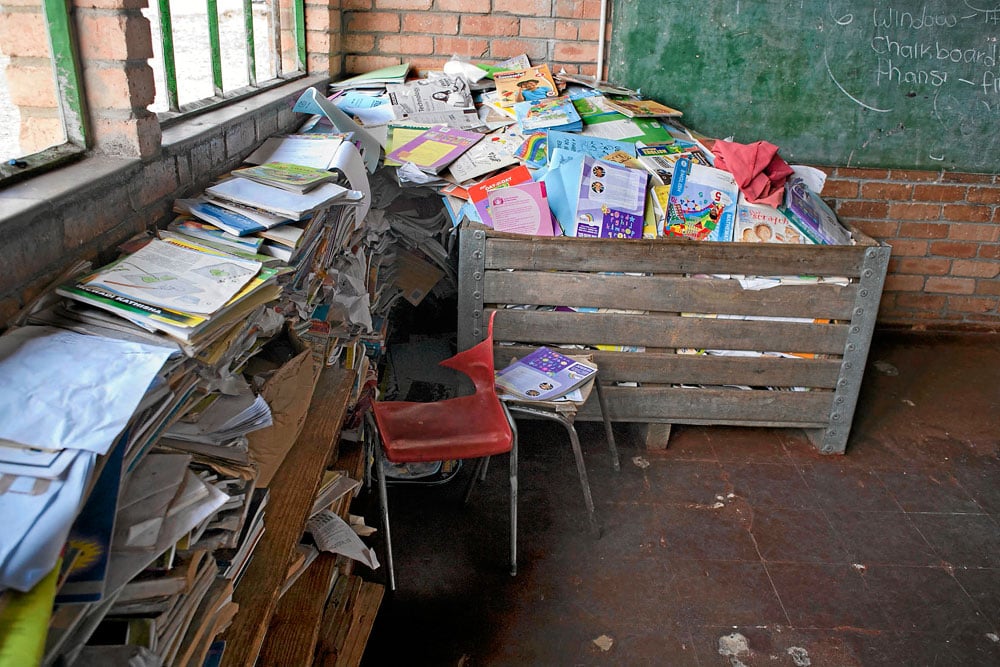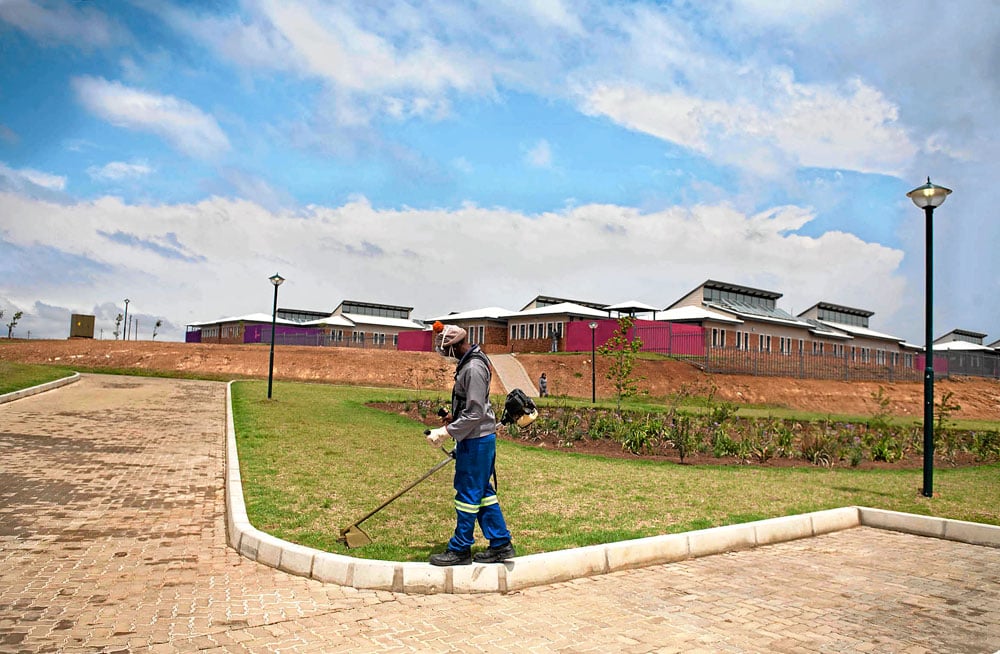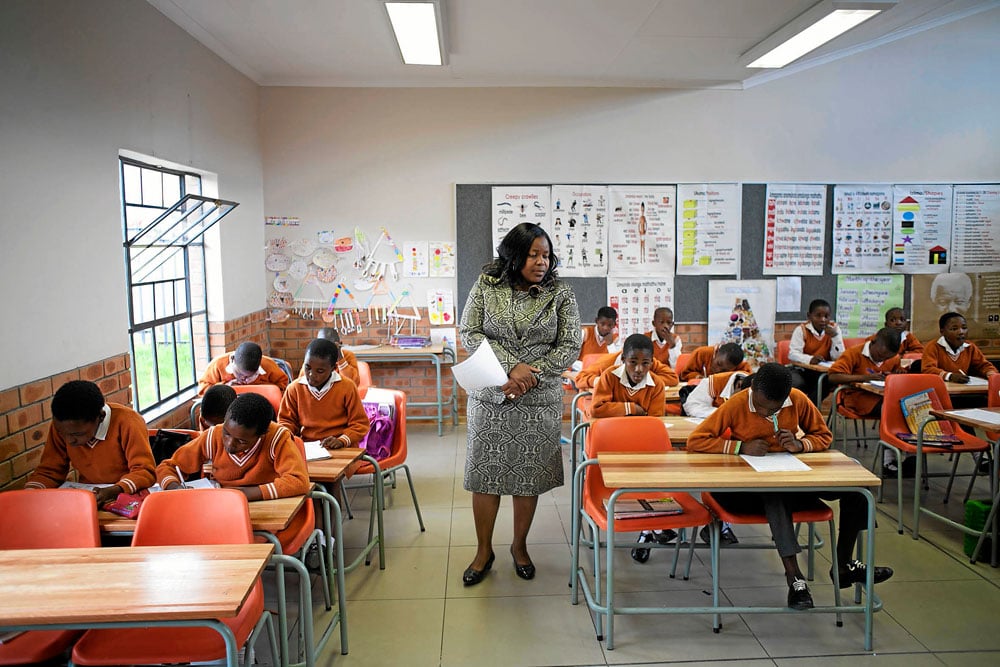One for all: Three classes are conducted in one classroom on a farm in Breyten
In remote rural areas of Gert Sibande district in Mpumalanga stand two modern public schools that offer answers to the country’s poor-quality education crisis.
The new Izimbali Combined Boarding School is in Amsterdam, a farming community near the Swaziland border. About 133km away in the likewise bucolic Wakkerstroom is the Ezakheni Combined Boarding School.
Built by the Mpumalanga education department, the multimillion-rand schools have replaced farm-based, poor-performing, multigrade schools in the two sparsely populated communities.
These schools replace 14 (nine in Amsterdam and five in Wakkerstroom) that had grappled with inadequate classroom infrastructure and were forced to run multigrade schooling.
The government’s teacher policy dictates that the smaller a school is, the fewer teachers it gets.
But, according to the South African Democratic Teachers Union (Sadtu), Basic Education Minister Angie Motshekga is delaying a review of the policy.
The union resolved at its recent congress in Benoni, Gauteng, to “engage in a national campaign for the implementation of the ANC’s Mangaung conference resolution on post-provisioning”.
The ANC resolved in 2012 that “in addition to numbers”, the model “must be informed by socioeconomic context and curricula needs”.
But two years after the resolution, Motshekga has not uttered a word publicly about an ideal model.
Her spokesperson did not respond to emailed questions.
The deputy general secretary of Sadtu, Nkosana Dolopi, said they wanted the model to be reviewed “because it does not respond to the challenges we’re experiencing in the township and rural area schools”.

Textbooks are in a muddle at a school on a farm in Breyten. (Oupa Nkosi, MG)
The establishment of Izimbali and Ezakheni in Mpumalanga has meant pupils from the 14 defunct small schools now have a full complement of subject specialist teachers.
This has drastically improved the quality of the education they receive. For the deprived children of measly paid farm labourers, boarding school has also enhanced their quality of life.
But thousands of other rural pupils around the country are still in multi-grade schools. The department’s statistics show that 5?339 – or 21% – of the country’s schools have multi-grade classes. The majority are in the Eastern Cape, with one-third of the schools (1?929 of 5?753) being multi-grade. There are 815 in KwaZulu-Natal, Limpopo has 523 and Mpumalanga has 500. Even in the Gert Sibande district, where Izimbali and Ezakheni were built, there are still many multigrade schools.
One school the Mail & Guardian visited in the district has two teachers for grades one to seven, and there are two classrooms. In line with the teacher-supply model, the school will not receive any more staff because it has fewer than 60 pupils.
“The department won’t give us a teacher. It [the staff model] is problematic to smaller schools,” said a teacher, who spoke on condition of anonymity.
Teachers at Izimbali, some of whom were recruited from the old schools, are now relishing working at a proper institution.
“God is going to bless greatly whoever came up with this idea of closing the farm schools [around Amsterdam] and making one school,” said Samson Nkosi, the principal of Izimbali.
“Where the learners were attending, justice was not being done. Just imagine having five grades in one class taught by one teacher; do you think that the teacher was doing justice?”
Izimbali, which cost R189-million to build, has facilities that township and rural schools can only dream of.
When the M&G visited the school on a chilly day, pupils sat in warm well-ventilated classrooms, a world apart from their counterparts in other public schools.
Science and computer laboratories stand alongside a library, separate gender and age-group dormitories, sports grounds, a kitchen with full-time chefs, a laundry and a mini-clinic with a qualified nurse.
The pupils arrived at the school at the beginning of the second term and many initially battled with their schoolwork.
“If you compare the second-term performance to third term, you see great improvement. In the second term, performance was not good. For instance, in grade seven all 66 [from two classrooms] were not competent.
“But we can now see a difference. In grade seven, 50% passed in third term. This shows that gradually we’re moving in the right direction. They have had to adjust.”
Izimbali has about 500 pupils between grades R and nine, a number that is set to increase as the school phases in higher grades. It will have its first matrics in 2017.

The Izimbali Combined Boarding School in Amsterdam, Mpumalanga. (Oupa Nkosi, MG)
Simon Thanjekwayo, the Izimbali governing body chairperson, recounted how some of the pupils had attended the now closed Westoe Primary School near Amsterdam. Westoe had two classrooms – one for grades one to three and another for grades four to seven. Grade R pupils learnt in a shack that parents had erected. There were four teachers for 116 pupils.
“It was crammed. There was no proper learning and teaching,” Thanjekwayo said.
Ezakheni boasts the same facilities as Izimbali. The school opened its doors in 2011 and its first batch of matrics achieved a 73.3% pass rate last year.
Sandra Mahlakwana, a grade eight pupil, enrolled at Ezakheni this year. Sitanani, her erstwhile primary school, was multigrade. She said the multigrade system should be abolished “because it disturbs many children”.
The Ezakheni principal, Linette Spies, said: “For me, the fact that the learners came to this school at a right time of their youth and development [stage, is], a very important intervention that these learners will benefit from.
“They were neglected for an extremely long time. What’s very important is that the learners must also experience the very best.”
Zwo Nevhutalu, a former head of the Limpopo education department, is an advocate of the replacement of smaller schools with boarding schools.
“In sparsely populated areas, I believe that [boarding schools] are really the solution,” he said.

Getting it together: Pupils at the Izimbali Combined Boarding School in Amsterdam. (Oupa Nkosi, MG)
He said that when he headed Limpopo education, “I visited many small schools, and I can tell you the performance was always very poor. When you get a school producing a 0% pass rate, very often it was a small school and a school facing challenges of [the number of] educators and multi-grade teaching.”
Jasper Zwane, the Mpumalanga education department spokesperson, said by 2015 “there will be four [public] boarding schools” in the province. “The number of the so-called small schools will be radically reduced within the province.”
With some pupils as young as six, Nkosi said he needed to exercise “intense monitoring” at his boarding school.
“You have to know what is happening – where, when and who’s doing what and at what time,” he said.
A “plus” for the family man from eLukwatini, an Mpumalanga town, is that “I stay at the school 24 hours [a day]”.
There is also as much playing as learning at Izimbali – there are toys on the doorsteps of grade R classrooms.
After the pupils had their supper, Nkosi said he “makes sure the learners study”.
“After that we take them to the dormitories, switch off the lights and they sleep. I monitor things are OK before I go to bed.
“At 3am, I’m up to see to it that the cooks are there in the kitchen, preparing breakfast and everything is okay.
“Since they stay here 24 hours, seven days a week, you have to manage their academic life and hostel life. You must always be there to support them.”
Thanjekwayo said the children at Izimbali were in a much better environment than on farms where their parents worked.
“Here they get proper nutrition and grandparents no longer have the burden of feeding children with their grant money.”
Zwane said: “Some of the learners at these boarding schools are from child-headed families and they now have people to lean on at all times.”